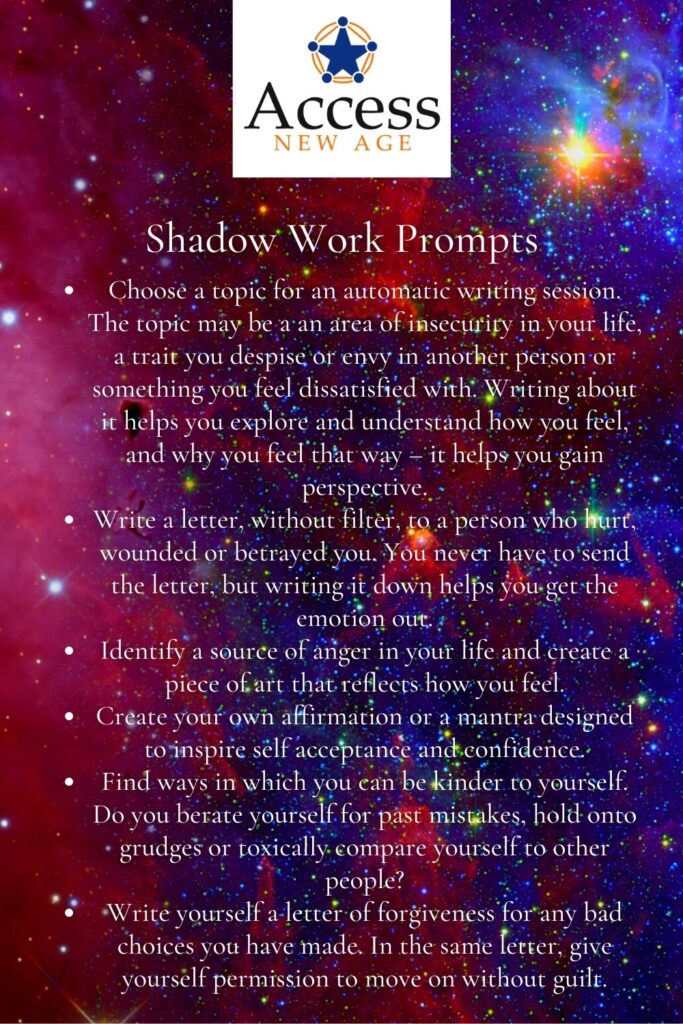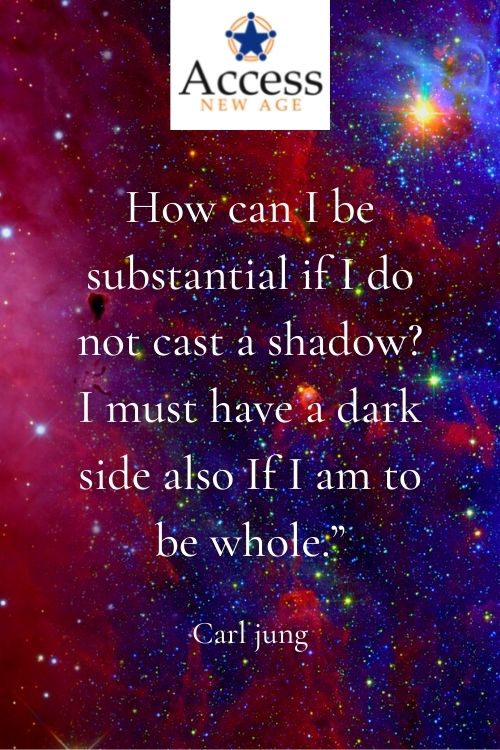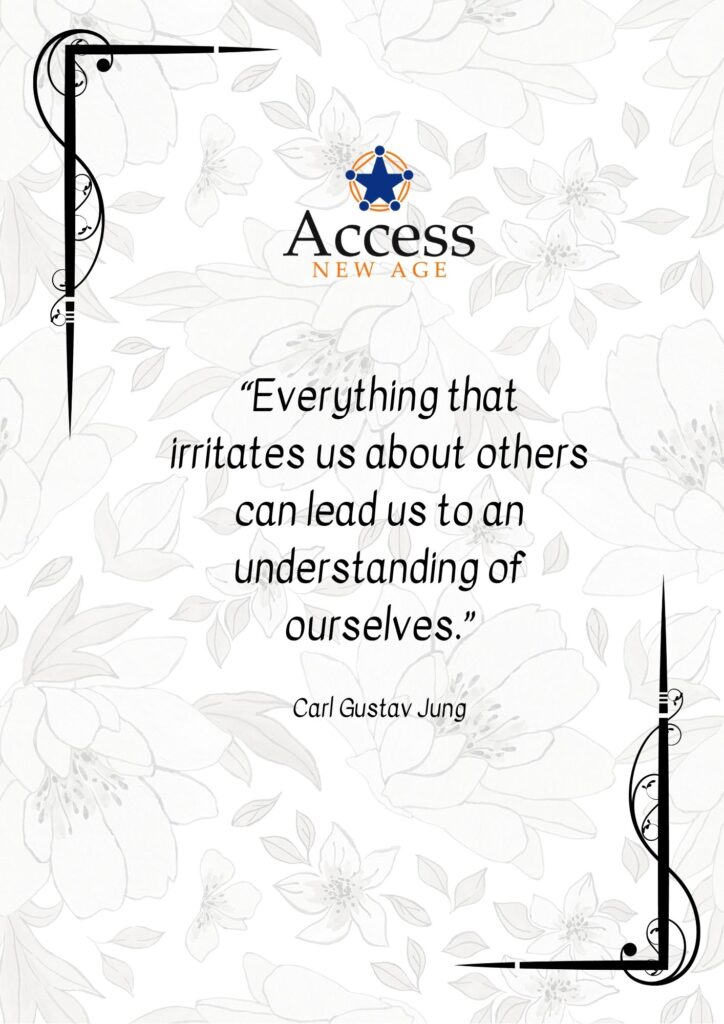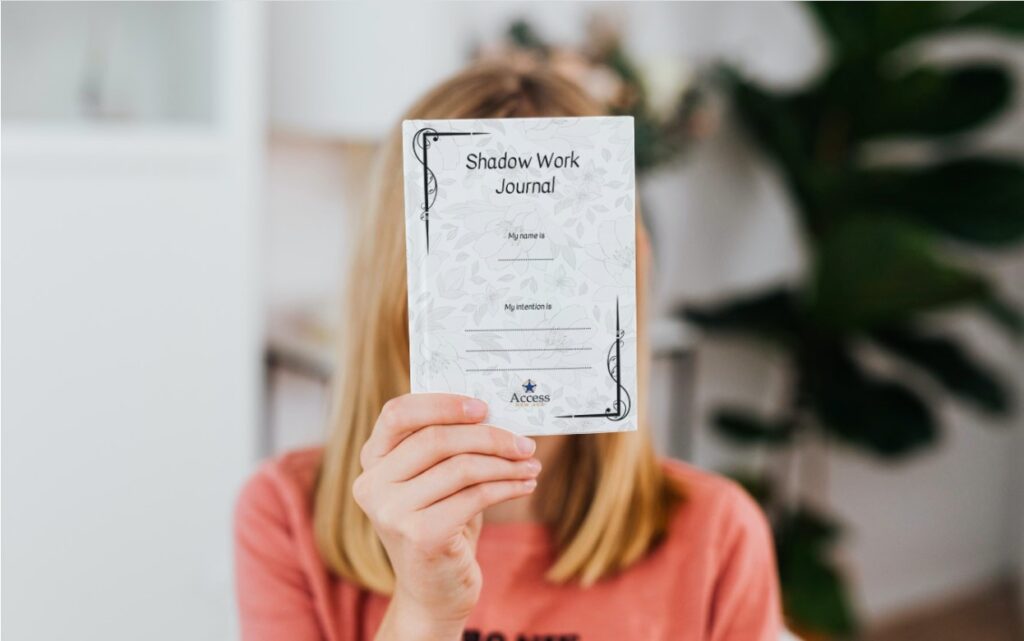Everyone has got a shadow.
The shadow is the parts of ourselves that we suppress and disown because we and other people around us find them unacceptable. The shadow consists of all the parts of ourselves that don’t fit into our brightly lit, civilised society.
Unable to purge or detach ourselves from our baser instincts, we learn how to suppress them instead. As we grow up we are encouraged by our parents and teachers to suppress our selfish, primal, violent or amoral impulses.
But if we can’t abolish the shadow parts from our personality altogether, where do they go?
The answer, of course, is that they accrue and accumulate in our unconscious mind. Over time, the divide between our conscious self – the self we have created and honed and decided to show to the world – and the unconscious shadow can become so deep and wide that we almost forget our shadow side. Yet the connection is always there, and sometimes, the more presentable and likeable the conscious self becomes, the more bloated and out of control the shadow may become.
Join our Facebook group to get the answers to your synastry questions from our experienced community.
It can be hard to admit – especially if we come from a very strict upbringing where we were taught to suppress a lot of ourselves and were taught to quickly mould ourselves to fit societal expectations – that the shadow is a natural and inevitable part of us. And that it is as real and true, if not more so, than the more manicured, watered-down versions most of us present to the world.
We each have our own complicated relationship with our shadow. Many spend their lives running from it, denying its existence within themselves and only seeing the shadows cast by others. Then there are those who become consumed and overwhelmed by their shadow, becoming its helpless puppets, enslaved to their darkest and most primal impulses and desires. Individuals who fall prey to their shadow selves may become hardboiled criminals, such as rapists or serial killers.
Finally there are those who, knowing that they cannot run from their shadow, make friends with it instead. These individuals carve out pockets and spaces in their lives where the shadow may come out to play and express itself without hurting anyone. It is easy to see which approach out of the three is the happiest and healthiest.
Embracing the shadow comes with a plethora of positive benefits and incredible rewards. The shadow is, after all, a storehouse of raw animal power. Whereas the logical, conscious mind is careful and controlled, the shadow is impulsive, creative, shameless, ambitious, unapologetic, hedonistic and unfettered.
A well integrated shadow can add layers of dimension and intensity to our creative endeavours, imbue our life journey with a sense of adventure, and help us shed our inhibitions and truly go for what we want in life.
But it takes significant guts to confront your shadow, to look it in the eye and to accept it as part of you, not something to be ashamed of.
The conscious and unconscious sides of our nature work best together, when they are balanced in perfect harmony like the yin yang symbol. After all, without our shadow selves, we are only half of ourselves.
Shadow work is the process of becoming whole.
Where does the shadow come from?

As part of our socialisation we learn to connect the self-serving sides of our nature with feelings of guilt and shame. For example, a parent may scold a child that selfishly takes and eats their younger sibling’s cookie. This imprints on the child’s young and impressionable mind the idea that taking more than your fair share in any situation is unacceptable behaviour.
Similarly, we learn to connect unwanted behaviours with negative consequences like being scolded, grounded, yelled at otherwise punished by the adults on whom we depend.
On the flip side, we learn that good behaviour, wanted behaviour, results in praise, affection and acceptance from our adult caregivers and teachers. In short, as we grow up, we learn to distinguish the behaviours and personality traits that are wanted and acceptable from those that are not, and we become adept at modifying our behaviour accordingly.
Children do not experience feelings of guilt and shame, or conversely, altruism and generosity, as adults do. To a great extend, these feelings and attitudes are learned behaviours that are at first imposed on us from the outside until they are eventually internalised.
We all have an inherent need for acceptance, a longing to be embraced and rewarded by our peers. Part of growing up is learning which parts of our personality to show to the world to garner acceptance, appreciation and promotions, and which parts to hide, shove down and ignore in order not to risk rejection, humiliation or punishment as a result of expressing them.
It is important to understand that our shadow is not just our own shadow – the parts of ourselves we refuse to acknowledge and own – it is very much the shadow of society, an accumulation of neglected and disowned collective values.
The more of ourselves we suppress, the stronger and darker the shadow becomes – all those disowned parts of ourselves have to go somewhere, after all. They don’t disappear just because we want them to.
Where does the shadow go?
Our shadow grows in strength and density with every aspect of ourselves that we abolish from our conscious mind and personality – metaphysically, the shadow feasts on and gathers strength form all of the unwanted scraps.
But just because we suppress and shun the shadow doesn’t make it go away – we can never escape our animal nature, our primal instincts, our less-than-noble desires and impulses. We can hide them, somewhat, behind a more presentable facade.
But no matter how much we push and shove, the shadow part of ourself is always there, following us around wherever we go like, well, a shadow. The shadow is our constant companion, with us till the day we die. In other words, the shadow doesn’t go anywhere – but it may become hidden further and further beyond the light of our conscious selves. The less we acknowledge the shadow, the more freedom it has to control us from a place beyond our conscious knowing.
Whether we spend our lives is fear of our shadow self, in thrall to it, or at peace with and in control of it is up to us.

Carl Jung and the shadow self
Carl Gustav Jung (1875-1961), that most famous psychologist and student of the human psyche, was the one who first formulated the concept of the shadow – also referred to as the Id, the shadow aspect or the shadow archetype.
Carl Jung put it this way:’Everyone carries a shadow, and the less it is embodied in the individual’s conscious life, the blacker and denser it is.’
According to Jung’s definition, the shadow consists of all of the parts of ourselves that our conscious selves disown and relegate to the deep, dark waters of the unconscious. Our shadow consists of both our own, personal shadow, as well as the collective shadow created by our culture.
Carl Jung’s description of the shadow allows for the shadow to contain a plethora of both negative and, surprisingly to many, positive traits. The shadow, according to Jung, is every aspect of ourselves that is beyond the light of our conscious understanding of ourselves.
Our shadow self is perhaps the greatest mystery we will ever encounter. The shadow is unexplored territory, the parts of ourselves and others that we do not understand and often don’t see, at least not right away. The shadow is the hidden, unknown and inexplicable parts of our psychology.
When we stove the shadow away, it can gain more power over us. If we don’t understand or acknowledge the urges, desires and drives of our shadow selves, we are essentially travelling through life with an unknown and hostile force at the wheel.
When the shadow is deeply repressed it often finds expression in the form of projection. Projection is when a personal inferiority or shortcoming is not acknowledged in oneself and is instead seen a moral deficiency in someone else. Projection creates an ever thickening veil of illusion and reality-distortion between the person creating the projection and the surrounding world.
If you have ever encountered a someone who is very critical and judgemental of others while unable to see any flaws in themselves or admit any fault of their own, you have come across a person with a deeply suppressed shadow side.
According to Jung, if the shadow remains repressed, it ‘has a free hand and can realize its object – if it has one – or bring about some other situation characteristic of its power.’ In other words, the harder we suppress the shadow self, the more it controls us. When the shadow is fully hidden from view of our conscious selves, it is at liberty to pull the strings in our lives from behind the curtain.
The shadow will always find a way
Jung described how our suppressed shadow self may haunt us in visions and dreams – if it can’t reach us in our conscious, waking state, it will come for us when we are intoxicated or asleep, when we are off guard.
Our shadow side may manifest in dreams and take on the appearance of a person, typically of the same gender as ourselves. No matter how diligently we shut it out in our waking state in dreams the shadow is free to will whisper in our ear and plant seeds in our minds. If we keep ignoring the shadow and its agenda, its seeds can grow into weeds in our lives and personalities undisturbed.
The shadow has many layers
Jung further described that the shadow self consists of multiple layers of shadow. Its top layers consist of our own repressed pain and personal experiences. The deeper layers of shadow consists of the repressed and unknown psychic content of all human experience.
The shadow goes deeper than we can ever know.
Nevertheless, this doesn’t mean that we should give up on exploring the shadow and plummeting its depths. Quite the reverse, encountering the shadow, merging with it and assimilating it are all vital parts of our individuation, the process of becoming ourselves.
What does shadow work mean?
The crux of shadow work is to make the unconscious conscious, so that we gain power over it rather than allow it to gain more and more power over us.
The Meeting, merging and assimilation of the shadow

Shadow work consists in meeting the shadow, merging with it and assimilating it into our lives in healthy and productive ways.
Shadow work requires self reflection, as well as a great deal of bravery and dedication to the cause. Deep diving into the deepest, darkest aspects of our minds is no mean feat. The shadow self contains many psychological splinters and sharp edges. Repressed trauma and painful memories reside within the shadow.
For this reason, shadow work should not be undertaken lightly, but only when you are ready. You don’t need any particular setting or circumstances before you can embark on a shadow work journey, but you should approach it from a place of mental-emotional fortitude.
Meeting the shadow can be overwhelming and might entail quite a bit of pain and discomfort. The experience can be unsettling and destabilising – this is doubly true if you are not in a good, solid place mentally.
Facing our shadows takes commitment and tenacity, and a true willingness to look our dark side directly in the eye.
Facing the shadow is hard work, but it is ultimately one of the most rewarding journeys a person may choose to undertake.
Consequences of ignoring the shadow
Disowning our shadow comes with a range of serious and negative consequences. Denying the shadow is the same as denying parts of who we are as human beings.
Depending on how we have been raised and socialised, the things we repress and push down into the shadow may include not only selfish or cruel impulses that necessarily need to be kept under control, but also positive traits and vital aspects of our personality and our authentic self expression.
Dissatisfaction
Repressed shadow aspects may include our true sexual identity, our adventurous spirit, our creative force and our ambitions. By denying these aspects of who we really are and what we want, we are denying ourselves happiness.
Repressing key aspects of ourselves on an ongoing basis takes a lot of mental and emotional energy. It is taxing at the very least and is likely to compound over time into severe depression and intense dissatisfaction with life.
Projection
Projection comes next. If we suppress and hide our insecurities or even deep-seated aspects of who we truly are, seeing others confidently and naturally embrace what we secretly, perhaps unknowingly, want for ourselves is extremely painful. With nowhere to go, the shadow starts lashing out by criticising, judging or even physically attacking other people who express or live out what we have relegated to our shadow self.
For example, if repressed homosexuality is found in a person’s shadow, this person is likely to be very vocal about their disdain and hatred for gay people. Of course, the person in this example is merely angry at themselves, and their inner conflict is powerfully triggered whenever they find themselves in the presence of an out and proud gay person or a happy gay couple.
Another example could be the man who refuses to date a woman if she is a higher earner than he. Of course, the woman in this example has done nothing wrong, but her success has triggered a deep shadow insecurity in the man.
The missing piece
In some cases, we become conditioned to suppress parts of ourselves from early childhood.
For example, if a young boy or girl who loves to perform and entertain is repeatedly told by his or her parents that this joyful and playful self-expression is attention seeking and wrong, the child is eventually going to internalise these views and start suppressing the creative drive.
Repeatedly being told that our creativity, sexuality, ambition or hunger for life is wrong, shameful or selfish eventually causes us to believe it, and so we bury these things. We de-fang our personality to fit in, because we have come to misidentify our confidence as selfishness, our authentic desires as wrong or dirty. We suppress and suppress them until we no longer recognise them as part of ourselves. They have become part of our shadow self and we have lost sight of them.
Depending on how deep and forceful the suppression is, we may have a sense that there is something about our existence is lacking, but eventually we may not even be able to put a finger on what it is that is that we miss.
The bottom line is that disowning the shadow part of ourselves is the same as disowning self love, self acceptance, and true power and happiness.
Benefits of embracing the shadow
There are a myriad benefits to embracing our shadow self.
Often portrayed and treated as a villain within ourselves and others, the shadow is much more akin to the antihero archetype, encompassing a multitude of both positive and negative traits. While the shadow contains danger and darkness, it also contains raw power, creativity and unbridled life force.
Self awareness
Engaging in the kind of reflection that that shadow work entails teaches us a lot about ourselves. The shadow work process is the process of exploring, discovering and learning to accept ourselves. Nothing is more self loving or fulfilling than being at peace with who we are, even if we are not perfect. There is real strength in looking our shadows in the eye and letting them know that we see and accept them – and that we are in control.
Authenticity
Embracing our shadow can help us process our difficult and ‘unacceptable’ emotions, heal psychological trauma and self esteem issues, and break down limiting beliefs and inner barriers that keep true joy and fulfilment at bay.
Acknowledging and accepting our shadow self is key to self compassion, self healing and embracing our authentic selves.
Happiness
The ultimate prize to be won from confronting our shadows is enjoyment of and satisfaction with our life journey. Allowing ourselves to express ourselves authentically and fully, we become complete. Ironically, embracing the shadow is what allows us to stand fully in our own light.
While the shadow out of control can bring great pain and destruction to both ourselves and the people around us, the shadow embraced is a key to self acceptance, great mental health and self esteem, fulfilment and joy.
How do you do shadow work on yourself?
Shadow work is the process of acknowledging, reclaiming and owning suppressed and hidden parts of ourselves. Shadow work is holding space for the sides of yourself that nobody else wants to embrace. . Self love is at the core of what shadow work is.
Set boundaries
How you choose to encounter and deal with your dark side is entirely up to you – and only you can know how deep and intense you can go.
Most of us have a lot of shadow to process – if we fail to set boundaries around our shadow work it can easily become all-consuming. Make space in your life for shadow work, but don’t let it become an obsession that overwhelms you. Embracing your shadow parts should be an empowering experience, even if it is also difficult and at times painful.
Go at your own pace
Remember that there is no rush. Shadow work is an ongoing practice of self awareness and compassion. If you need to step back from doing shadow work for a while, this is entirely okay. The shadow will still be there the next time you choose to look. It is important to consider your mental health when doing shadow work.
When you embark on shadow work it is important to keep in mind that it is a process, a journey. Shadow work is not something that is done once and for all. Making friends with the shadow can be a life long piece of work.
Having self compassion and patience going in is vital.
Your shadow, your way
Shadow work can be done in many different ways and with varying degrees of intensity. You might want to dive into your shadow with the assistance of a psychologist, or you may go in alone, armed only with a journal for self reflection.
Shadow Work Prompts
- Choose a topic for an automatic writing session. The topic may be a an area of insecurity in your life, a trait you despise or envy in another person or something you feel dissatisfied with. Writing about it helps you explore and understand how you feel, and why you feel that way – it helps you gain perspective.
- Write a letter, without filter, to a person who hurt, wounded or betrayed you. You never have to send the letter, but writing it down helps you get the emotion out.
- Identify a source of anger in your life and create a piece of art that reflects how you feel.
- Create your own affirmation or a mantra designed to inspire self acceptance and confidence.
- Find ways in which you can be kinder to yourself. Do you berate yourself for past mistakes, hold onto grudges or toxically compare yourself to other people?
- Write yourself a letter of forgiveness for any bad choices you have made. In the same letter, give yourself permission to move on without guilt.
Can I do shadow work for someone else?
Unless you a re a trained mental health professional and someone has asked you to step in, you should not interfere with other people’s shadow work journey. You may see the need for it – they may not. We each have our own journey to undertake, on our own time and initiative.
This doesn’t mean that you can’t shadow work you relationships with the various people in your life – but it does mean that you have to tackle the situation from your side of the equation.
If, say, you have a difficult relationship with one of your parents and there is a lot of shadow surrounding your connection, you need to focus on you and how this has affected you. You can’t change other people’s behaviour or outlook on life, and it is not your responsibility to do so – you can only change your own.
Your shadow work practice is yours and yours alone. It should be focused on exploring your mind and dealing with your shadow parts, not anyone else’s.
What is shadow work in therapy?
Shadow integration can be done on your own, or with the help of a therapist.
If you choose to work with a therapist, it is their job to help guide you through the inner landscape that is your shadow – but you will still have to do the heavy emotional lifting. Still, having someone there to listen and to suggest helpful exercises can be extremely comforting and can also help keep your shadow work practice consistent and on track.
A skilled therapist can help you heal trauma, insecurity and the connections you have with others through a shadow work process.
Another benefit of working with a therapist is that they may help you uncover blind spots and view things from angles that you might overlook when approaching the shadow on your own.
Is embracing the shadow spiritual?
Shadow work is highly spiritual.
Although it may seem contradictory to spiritual aims such as the attainment of enlightenment and higher states of consciousness, embracing our baser nature, its impulses and emotions, is crucial for the spiritual journey.
Reaching for the light without acknowledging the darkness is an unbalanced and ultimately delusional approach to spirituality. The truth is that the light cannot exist without the darkness, and that true understanding of ourselves requires the integration of both aspects.
True spirituality calls for acceptance of ourselves and everything that we are, the spectrum of our psychology, the healing of our wounded emotions. Accepting ourselves without judgment is a step closer to true enlightenment than most people will ever come.
Shadow work for self healing
The integration of our shadows is a balm for the soul. If we can heal our judgment of ourselves and transcend the disdain we have for our imperfections, we can stand tall in our own light, a complete human being.
When we truly embrace our shadows, we become more or less invincible – the words and opinions of others don’t cut so deep if we have already faced our shadows, acknowledged that they are there and agreed to love ourselves anyway.
We can never go back and change the way we were parented and conditioned, but we can reparent and recondition ourselves. We can instil in ourselves the confidence and the self acceptance we were never granted growing up. With conscious effort, we can begin to heal the limiting beliefs and negative emotions we hold, replacing them with positive feelings and a healthy self image.
Shadow work to heal relationships
We can never go back and change the ways in which others may have treated us, bullied, abused or merely offended us over the years. But we can venture within ourselves and work on healing the effects that this has had on us.
It is important to understand that we are not responsible for how others see us or treat us – we are not responsible for, or defined by, the negative opinions others may have of us.
We are only responsible for ourselves, for learning to define our boundaries, and for healing the hurt others have caused us. We may never be able to undo what has been done to us, but we can work on what meaning we ascribe to it.
In shadow work, past pain and anguished are often transformed into strengths.
Shadow work techniques
Darkness can be processed and embraced in many ways, and you do not need to follow a set path or apply any existing technique. The work you do for youself and your own healing can be anything and everything you want and need it to be.
Having said that, here are some common and effective shadow work techniques.
Writing

There is something incredibly healing and freeing about the act of writing things down.
If you find that your level of self restraint is too strong for you to be able to break through and get in touch with your deepest and most uncensored feelings, try automatic writing. It is one of the most powerful yet instantaneous ways of getting in touch with your true emotions and unfiltered thoughts.
Automatic writing is essentially stream of consciousness writing.
The idea is simple: Get a pen and paper in front of you – writing longhand works best – and simply write what comes to you. To give direction to your writing, you may want to choose a specific part of your life to focus on. You may want to bring awareness to a particular relationship, friendship or topic, or you may choose to address your emotions on particular issues. You may, for example, choose your flawed relationship with money as the topic for an automatic writing session.
You can set a timer if you want, or put on some music that loosens up your thoughts. Then just write, without holding back or censoring yourself. Your automatic writing practice is just for you – it is a way for you to get your emotions out, black on white. No one else is ever going to see what you write (Unless you decide to share the results of your writing session with someone). None of the emotions that come out on paper are unacceptable. Write without filter. You can always dispose of your scribbles later.
Art
Making art or music works similarly to writing – only it is more abstract and less rational.
There is great freedom in art, because a piece of art is not beholden to having to make sense. Art can be a raw and intimate form of self expression, and making art can be an incredibly liberating experience.
Art is also a great way of expressing things that we cannot find the words for or are unable to articulate in any other way. If there is something in your mind or in your soul that doesn’t seem to belong anywhere else in your life, it belongs in art.
Keep in mind, as with the stream of consciousness writing, that you will never have to show your art to anyone, unless you choose to do so.
Shadow work is a process, not a destination
You will never be able to dispel and disperse your inner shadow once and for all – but you can make peace with it. When winning the war is not an option, strike a truce.
Make space in your life where your darker side can come out and play or find expression. Process your emotions and acknowledge your imperfections, without allowing them to overwhelm you.
Keep an open line of communication with your darker side, so that it can’t surprise you.
If we can stand tall and accept the things about ourselves that we have been told are wrong, selfish or amoral and incorporate them into our lives in some way, the reward is a rare level of confidence and ease as we make our journey through life.
Shining the light of awareness on the shadows you carry around is a brave and important step in and of itself. The mere awareness of the need to address your issues is several steps in the right direction, the direction of healing.
Embracing our shadows just might be the most powerful act of self love there is.
Truly understanding What Is Shadow Work? Meaning, Guide & Prompts could mean the difference between great happiness and misery down the line. Find a psychic medium near you today, whether you’re in New York City, Chicago, Utah, Seattle in the US, or somewhere completely different, you can get the expert guidance you deserve. Don’t forget you can also get a psychic email reading at low cost, or try the best online psychic reading sites such as Kasamba, Oranum, PsychicOz, Bitwine, Everclear Psychic and more.
Related posts:
- The Devil
- Dark Divine Feminine Energy
- What Does It Mean When You Dream About Someone
- The Moon Tarot
- Spiritual Awakening: Meaning, Signs & Symptoms
- Is There A Deeper Spiritual Meaning of Dreaming About Your Ex?
- The Ho’oponopono Technique: The Secret to Transformative Self Care
- The Five Human Design Types
- Spiritual Meaning Of Having Sex In the Dream: A Deeper Look into the Subconscious Mind
- Sexual Transmutation: How To Channel Your Sexual Energy



